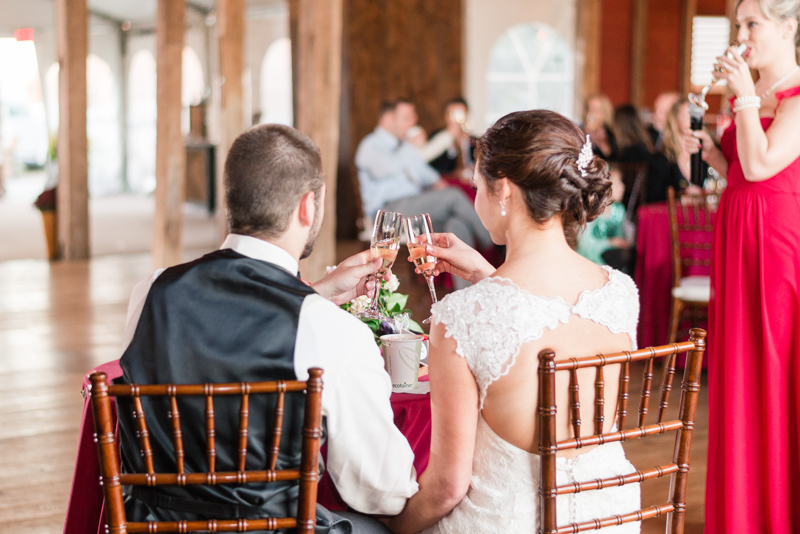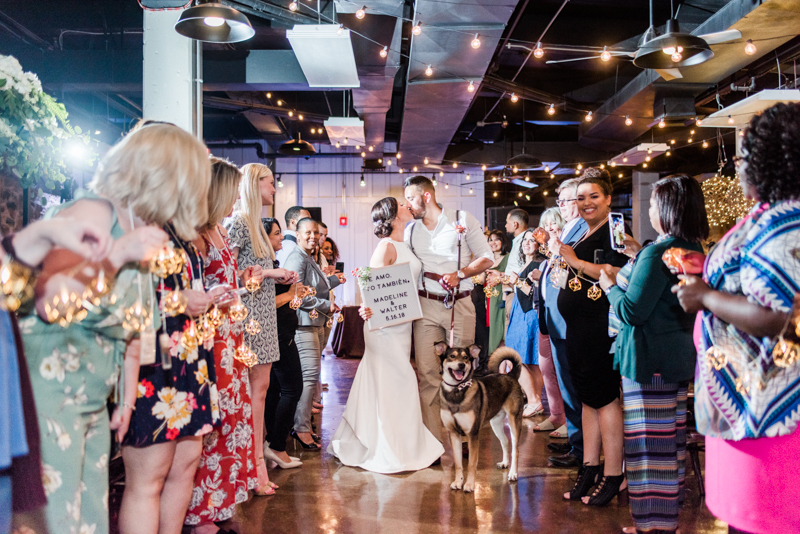6 Tips for Wedding Day Speeches
From Shawn
Hi everyone, Shawn here! As the weather warms up and wedding season commences, there is a lot of excitement for the couples beginning their life together. Most of the responsibility for a successful big day - including happy guests - falls on the shoulders of the bride and groom (and hopefully a select few who are tasked to delegate). However, in pretty much any wedding, there is an event where the loving friends and family have a chance to give back: speeches.
I know that speech preparation varies from person to person, with some planning ahead and printing out several pages of amazing content, and other individuals waiting until the day of to give a more dynamic presentation (of which I am guilty). Through my personal experience giving speeches as a best man and a groom, as well as witnessing countless speeches, here are some recommendations I've gathered to make the best possible speech for a wedding. This applies to bridesmaids or groomsmen nervously preparing words, fathers or mothers expressing joy, or brides and grooms who want to politely aid (or warn) one of their upcoming speakers.
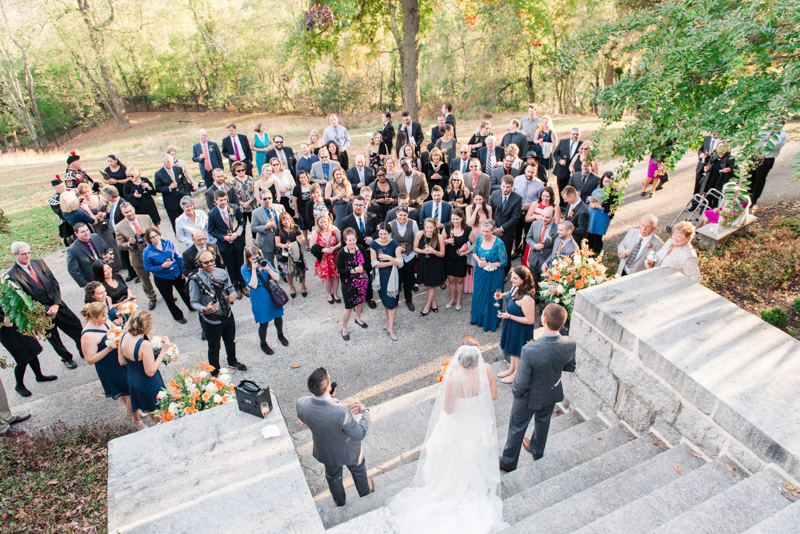
1. Set the Mood through Structure
Weddings are very sentimental events, since they mark a huge point in the lives of the couple. But that doesn't mean they can't be a lot of fun, too! A wedding speech balances a fine line between the sincerity of the moment with the lighthearted fun of the celebration. Preferably, speeches capture both of these feelings, and delivers them to the audience. Think of them like a movie soundtrack, underlining a films significant moments. The trickiest part is not letting any one emotion overshadow the rest. It's easy to forget during a funny speech that it's a wedding and not a roast. Spending too much time on the sentiment makes it harder for everyone to remember to have fun.
Luckily, there's an easy strategy we're going to borrow from literature as the classic Three-act structure. In Langauge Arts, you might have heard this referred to as "beginning, middle, and end" or "introduction, body, and conclusion," but the concept is all the same.
Act I
First, we want to introduce who you are to the guests, how you know the couple (both of them), how excited you are for this day, and share any brief anecdotes about your history. Feel free to interject humor as appropriate here, but don't spend too long trying to make it a stand-up routine. Just lighten everyone up and get them ready for a good time while helping them understand who is talking to them. Make it enjoyable, but not lengthy. Allow enough time so that everyone is settled and ready for the main course of the speech to begin.
Act II
Next, we want to elevate the conversation a little. During this part, you should be talking mostly to the bride and groom, since they are the reason you are there in the first place! Obviously, you should still be relatable for the guests (e.g., keep inside jokes to a minimum), but focus on information that you would tell the couple that maybe you haven't shared with them. As you move further towards the end, you should also be shifting away from trying to inject humor. Even the most jovial lovers can treat the evening with the seriousness it deserves. Tell the couple how you knew they were right for each other, or share with them your positive experience of them together that made you feel they were perfect for each other.
Be sincere about what you are telling them (without sounding too grave or humorless), and let them know they are special to you. This is usually the biggest impact of the speech. It's the one that should be packed with the most unfiltered feelings, particularly since it's not often we are told how much we matter to others. Such a pivotal moment during a wedding is the optimal timing to encourage the couple, while reinforcing your bond.
Act III
Finally, the conclusion can start to work everything back into the party. Introduce a few lines of amusement to dissolve any tension (or misty eyes for especially powerful speeches) and let people know the touching parts are over. Reiterate how you feel about the couple, and maybe a few more lines to finish up your ideas. Make sure to conclude any open threads in the speech, like the ending of a story, a conclusion of a thought, or a summary joke you feel applies. Prepare everyone for the festivity that will commence with the reception (even if there is another speech after you) and a toast if it's appropriate. Definitely remember to go in and give the couple a hug, too! It's a great way to wrap up every good speech.
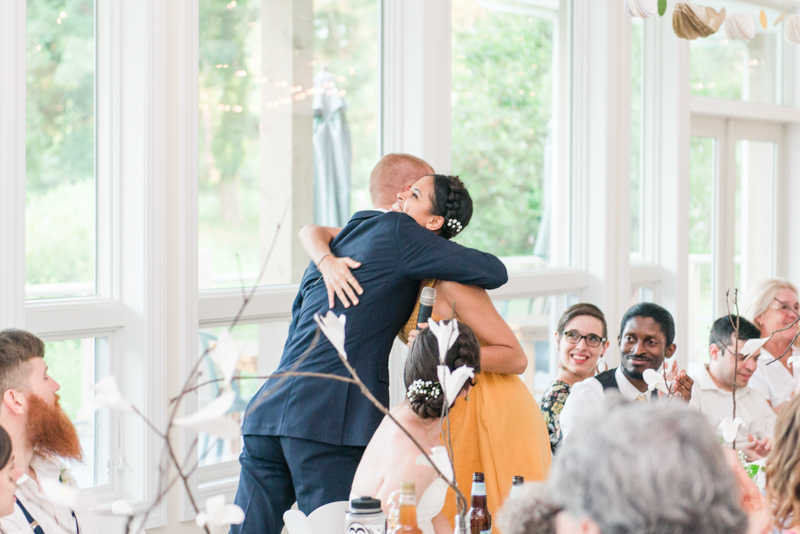
2. Always Have a Point (Keep it Concise)
This section is a little bit of a double hitter, but I'm sure any guests (and maybe even the bride and groom) will have to agree with the gist of my argument here. Nothing ruins a speech "faster" than it running on too long. Usually, multiple speeches happen in a row, and right before dinner. As much as the guests want to listen to every speech, it's easy to unintentionally stop paying attention if it continues without direction.
Make sure every thought (and preferably, every sentence) has a reason to be spoken. Is it to underline something special about the couple? Does it show the guests a personal understanding you have that leads them to appreciate the groom's personality more? Is it a heartfelt sentiment you are giving the bride? Whatever the reason, double check that it is a subject you feel is important to share with the entire room. Remember, all eyes and ears are on you for this moment. Treat it with respect by acknowledging their time matters. At the end of every topic, there should be an important detail you hope the listeners will consider.
Also, it is best to avoid long narratives about the couple that don't have a clear message. While I don't doubt there are a lot of crazy stories you have, saving it for the reception is the best option. Then, that one time in college can actually be a conversation instead of a presentation. It also avoids singling out half of the couple when they are both front-and-center of the guests. The latter of which, brings us to the next important detail...
3. Mention Both Sides of the Couple
Surprisingly, this can end up being the hardest for some speakers. After all, you are much closer to one half of the couple than the other, especially if it is your sibling or child. Never forget the wedding is about the couple, and the speech should reflect this. Under the most likely circumstance, you should know details about the entire couple and have met the other half more than a few times. Even if that is not the case, you can at least explore how amazing the relationship is. It's okay to be a little biased about which one you mention more, but always relate it back to how their significant other impacted their life.
There are multiple reasons for this to be a prime factor in your speech. First, as a guest trusted with the responsibility of sharing your thoughts, you presumably have a greater insight into the individuals in the relationship. Expand and deliver this fascinating information so everyone can enjoy the relationship. Second, you don't want to alienate half of the couple by leaving them out. We've unfortunately seen quite a few brides tune out while a best man describes a silly situation, or a groom stare off while a maid of honor talks about how the bride was always indecisive. Mentioning both lovers makes sure neither feels ignored. Finally, everyone at the wedding knows someone in the couple, but it's not common for them to know both. Sharing more information about the spouse people are less familiar with helps them learn more about the couple as a whole.
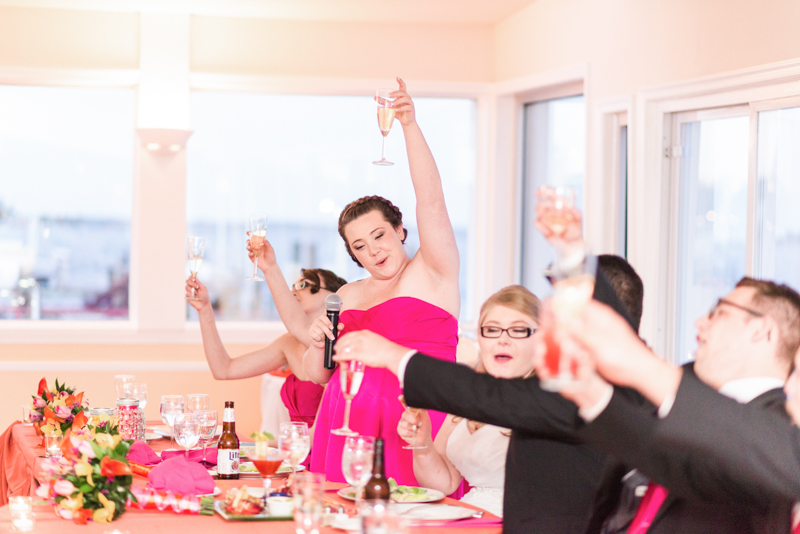
4. Create an Outline
This is more of a general strategy for giving speeches straight from a college Communications class. For any kind of public speaking, always have some form of outline ready to go. This will differ between people with how much detail they prefer. I personally work better with a very loose outline that bullets my main points and has a few examples. Others might prefer a full draft of their speech that highlights every fact. Whatever you find fitting for your style is great, but just be sure to create one. An outline will keep you on topic and help you see the obvious structure of your speech (as mentioned above).
My personal advice is to keep your outline as a literal outline, and not a full draft. Nothing is more stressful and red cheek inducing than losing your place while reading a script. The embarrassment is reinforced when you have to keep your nose down in a page (or phone). Track each idea you want to cover as a bullet. That way it's much easier to jump to a place when you finish a topic. By all means, keep a full copy of your speech available for practicing, but when you go to take the microphone, only bring the Cliff Notes version with you.
5. Do What Comes Naturally
Being genuine is hard to do when you're trying, and easy to detect if you are faking. This is quite a conundrum when trying to follow what I mention above and also remembering to "be you". It's okay, though! Here is a simple rule of thumb I know can solve this. Feel free to repeat it whenever you are feeling stuck: "break what isn't working". This applies to any ideas you have for your speech, and conventional wisdom you're given.
It might feel unspeakably heinous since we are told to not break the rules, but I guarantee that it's okay. Nobody is enforcing these rules, and while they are recommended for a reason, everything is best left up to your judgement. If you want to share a hilarious story from your childhood with the groom, then go for it! Struggling to come up with a way to eloquently describe your feelings about the bride? Drop it and maybe come back to it later. Ending your speech early because you can't help but cry and need to give the couple a hug are also perfectly okay.
Being true to what you feel is right supersedes any input given from others, including myself (much to my dissatisfaction). While you may want to make your speech enjoyable to everyone, it isn't your duty to please them. Chosen by the bride and groom means they are the ones you need to delight. Even then, nothing should stop you from sharing a particularly embarrassing story if you feel it's appropriate.
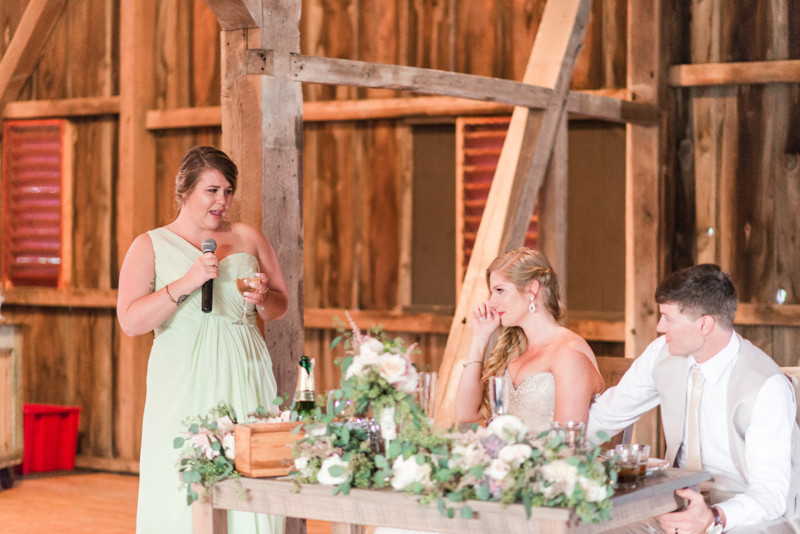
6. Most Importantly for Speeches: Share Your Story
There's an old adage that says "everyone has a story" which applies here. I can't stress this point enough, which is why I saved the best for last. If you ignore all of the other points in this post (including number 5), pay attention to this one. This point can drive you to instinctively follow the rest of the tips.
There is a reason you are up on stage or in the middle of the dance floor. Anybody can stand up and talk about how incredible the bride and groom are, but what makes it most remarkable is your unique perspective. It's our experiences that make us grow and direct us on how we see the world, including our opinion on topics like love. If you walk away from your speech without delivering a laugh out loud punchline or heartstring tugging confession, at least know that you gave the audience a unique outlook on the couple. Something about you makes you outstanding to the couple. Hone in on what that something is, and use that to drive the words you use.
